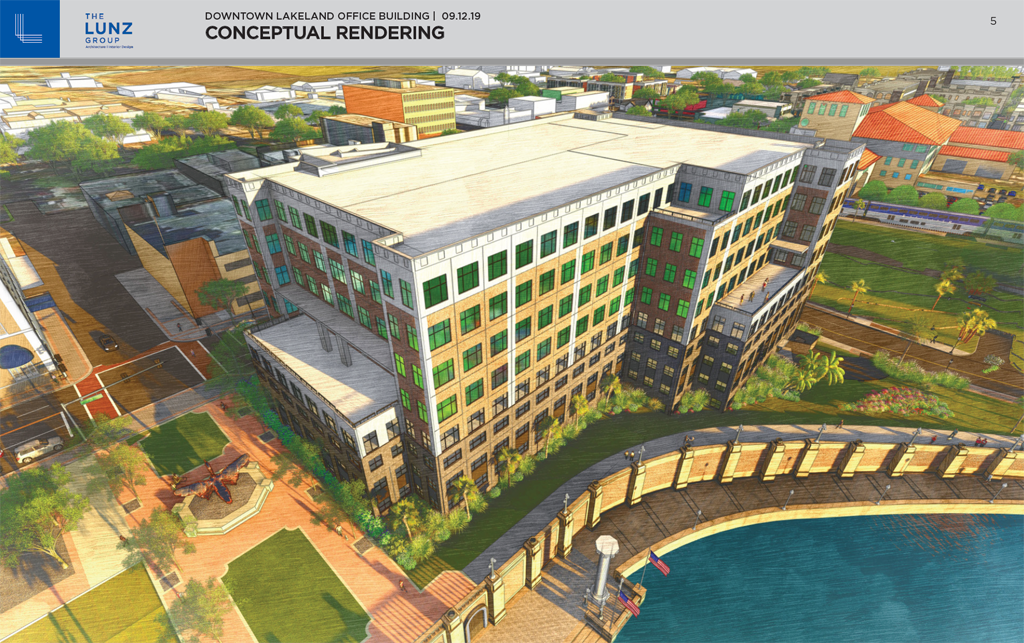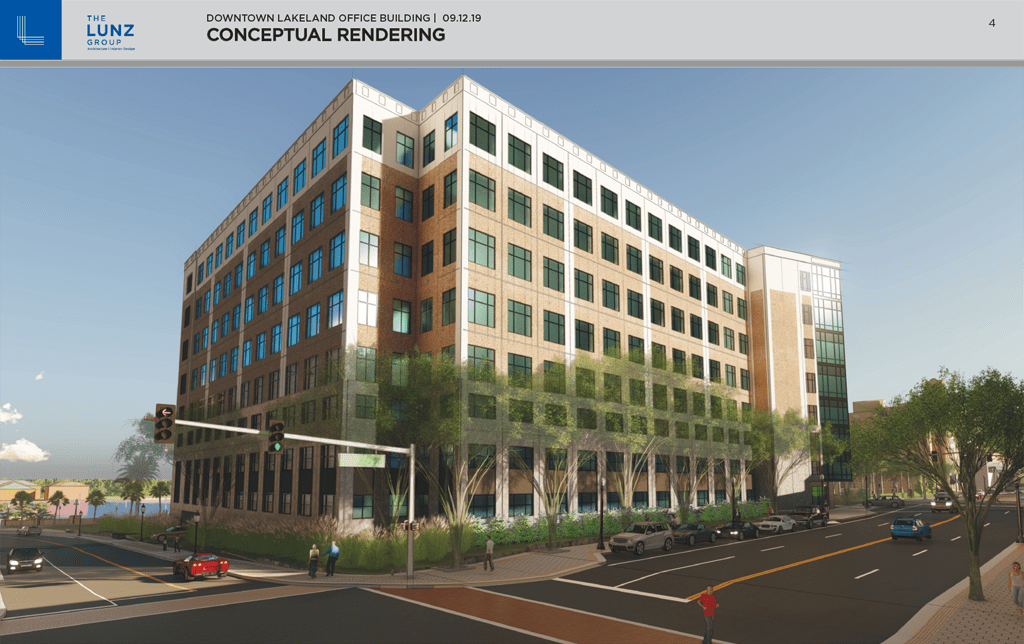
A project to move a Lakeland-based company and its 500 employees to a new downtown tower on Lake Mirror won approval today from the City Commission, which agreed to trade the city-owned land for a 30 year nights-and-weekends lease of 150 parking spots.
Summit, which specializes in workers’ compensation insurance, now has two years to start construction on the 135,000-square-foot, nine-story building at the northwest corner of Lake Mirror where the city once had a fire station. The bottom four floors of the building will be a parking deck.

The deal, which will see the city make the land-for-parking swap at an agreed-to value of $2.5 million, won with a five-member majority on the board. The agreement also specifies the city will kick in a $1 million subsidy and other associated costs like closing fees and document taxes.
City Manager Tony Delgado said he expects those additional costs will top out at about $400,000.
Voting for the deal: Mayor Bill Mutz and Commissioners Scott Franklin, Stephanie Madden, Bill Read and Philip Walker. Voting against: Sara Roberts McCarley and Justin Troller.
Franklin said the deal turns an unproductive property into a productive one, as the property taxes are expected to be about $250,000 a year once completed.
Further, it keeps a company and its jobs in Lakeland.
“These jobs are not guaranteed to stay here in Lakeland,” Franklin said. “This is not the first site Summit looked at, and some were not in Lakeland.”



Franklin, Mutz and Madden touted the tangential benefits to downtown when 500 employees join its daylight population, notably increased traffic to stores and restaurants.
The deal between the city and Summit was negotiated privately, a change from previous significant downtown development that started with a public and competitive bidding process. Here, the negotiated contract in its final form was first released to the public Wednesday.
The city did ostensibly open bids for the project in a public notice in the Oct. 4 edition of The Ledger, but the requirements for potential bidders limited to it to projects almost entirely like the one proposed by Summit.
Commissioners McCarley and Troller aired concerns about the deal and voted against it.
In particular, they criticized the secrecy.
“I feel like the process here has been opaque and has not been as forthright as I would be comfortable with,” McCarley said.
“A year or two ago we were talking about process, and the process did not include an RFP (a competitive bidding method), so we don’t know what we could have gotten for this site,” Troller said. “I saw this as the last remaining piece of our public jewel and I expected something with more public use.”
“We have a Catalyst plan,” he added, referring to a new vision for downtown presented earlier this year, “and the Catalyst plan did not have an office building on this site.”
Ultimately, he said, “we can incentivize whatever we want to incentivize; I don’t think this is the highest and best use.”
McCarley agreed about hoping to see a more public use, but she focused on what she said were loopholes in the contract that benefit Summit at the cost of the city.
For example, if Summit, after three years, decides it no longer wants to allow public parking, the contract allows the company to buy it out.
In that case, Summit would have to pay for the remainder of the months of the lease. After three years, that get-out price would be $2.25 million, Delgado said.
But that also ignores the additional cost taken by the city as part of this deal, McCarley said.
“I think we’re setting a precedent with this contract that could be a hindrance in the future,” she said.
Troller also noted that while the company told city administrators it had no interest in pursuing a tax relief incentive, there is nothing in the contract that would prevent them from doing so.
Delgado said that part of the contract was a result of Summit being worried about the liability of public parking in its building. The contract does specify the city can be given notice and an opportunity to fix safety concerns that arise, but does not require Summit to approve the city’s attempt to make it right.
But, the contract does also allows Summit to end the parking lease for “convenience.”
In response, Madden said there was no such thing as a perfect deal, but she was confident this would be good for downtown, and could spur additional interest in the city. She added that she would like to see a neighboring property on the northeast corner of Cedar Street and Massachusetts Avenue have more of a public use if developed.
Mutz said the project was a chance for Lakeland to grab at an opportunity during a strong economy.
“We have dreams versus realities,” he said, “and we can’t always match what we hope to have with the opportunities we see. This is certainly a bird-in-hand moment.”






